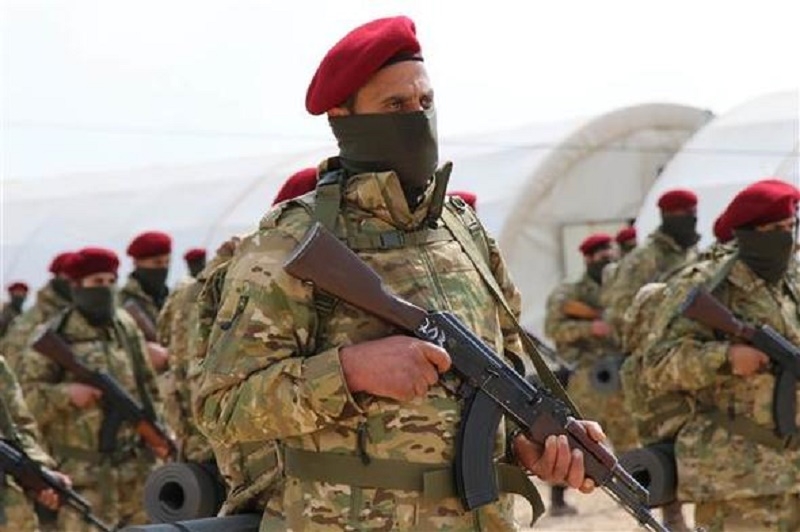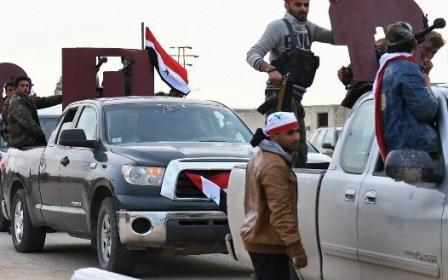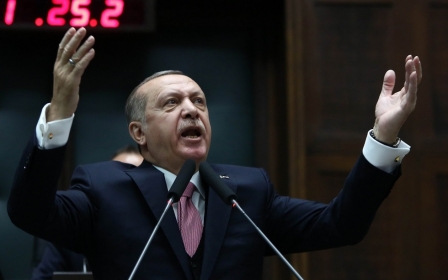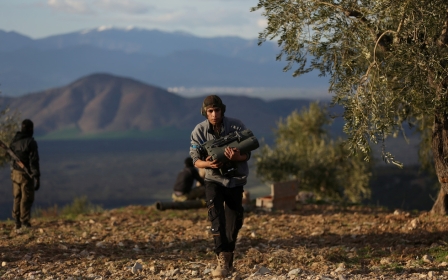Turkey sends 'Kurdish Falcon' force to Afrin to counter anti-Kurd image

ISTANBUL, Turkey – Trained, equipped and clothed by Turkey, a Kurdish fighting force has been deployed to the northern Syrian Afrin region to fight alongside Turkish forces.
The 600-strong Kurdish Falcons battalion, operating under the Turkey-backed Free Syrian Army’s Hamza brigade, comprises 400 ethnic Kurds from Syria’s Azaz region and 200 Syrian Arabs.
The deployment is an attempt by Ankara to counter impressions that the Turkish offensive is anti-Kurd and possibly to aid in the looming urban battle.
Images in local media showed the battalion at a graduation parade marking the completion of their special forces training.
We are the Kurds of the Azaz region. God willing, we will deliver our people from PKK cruelty in Afrin
- Hasan Abdullah Kulli, Kurdish Falcons commander
The Turkish president, Recep Tayyip Erdogan, last week said a siege of Afrin’s town centre was imminent.
Turkey launched an open-ended military offensive into Afrin in late January. It aims to clear its border area of what it says is a threat to its national security by the Syrian-Kurdish PYD and its YPG militia.
Turkey considers the PYD/YPG as the Syrian extension of the Kurdistan Workers’ Party (PKK) group, which it has been in conflict with since 1984 and lists as a terrorist entity.
Ankara has said it intends to wipe out the entire PYD/YPG presence from the Afrin region and not just the area on its border. This will require an urban offensive into the town centre.
While no recent census information is available, there were more than 30,000 people residing in Afrin centre in 2012 during the early days of Syria's war.
A large number of refugees from within Syria are believed to have added to the town's population as they sought refuge in the then relatively peaceful Afrin.
Apart from military engagement, the new battalion would ostensibly also provide valuable language assistance in the event of an urban assault.
Turkish police special force units and paramilitary units, both experienced in close quarters urban combat following clashes with the Kurdistan Workers’ Party (PKK) in Turkey’s southeast in 2015 and 2016, also arrived in Afrin over the weekend, media reports said.
“We are the Kurds of the Azaz region. We are members of the Hamza brigade. God willing, we will reach Afrin. God willing, we will deliver our people from PKK cruelty in Afrin,” Hasan Abdullah Kulli, the commander of the Kurdish Falcons battalion, was quoted as saying at the graduation ceremony.
Turkish officials have strongly rejected concerns over civilian casualties voiced by others actors present in the field and by other countries, saying they take the utmost care to ensure there is no such collateral damage. They claim such allegations are sheer propaganda aimed to undermine Turkey’s resolve.
Turkish officials have also been keen to stress that their military offensive in Afrin, like their fight with the PKK, is not against Kurds in general but specifically targets the PYD/YPG.
They hope the deployment of the Kurdish Falcons battalion in their ranks will help prove that as well.
Earlier reports also cited that Turkey’s ethnic Kurdish village guards would also be deployed in the Afrin offensive.
The village guards are ethnic Kurds from villages in south-eastern Turkey who are lightly armed and given a monthly stipend to act as a first line of defence in the face of PKK attacks.
Afrin and its town centre are majority-Kurdish populated and Turkish troops and the mainly Arabic-speaking FSA force would need language assistance if they enter the town centre.
To date various sides involved in the clashes in the Afrin region have provided differing statistics regarding casualties, both civilian and military.
Separately, Turkish Prime Minister Binali Yildirim over the weekend said around 350,000 people from Afrin had sought refuge in Turkey.
He didn’t expand on whether they had come after the offensive was launched or were part of the influx of more than three million Syrians to have sought refuge in Turkey since the outbreak of the Syrian war.
Ankara has also said the month-long Syria ceasefire agreed at the UN Security Council does not apply to its Afrin offensive. Media reports stated that Turkish troops continued to encircle Afrin and prepare for an urban assault on the town centre.
New MEE newsletter: Jerusalem Dispatch
Sign up to get the latest insights and analysis on Israel-Palestine, alongside Turkey Unpacked and other MEE newsletters
Middle East Eye delivers independent and unrivalled coverage and analysis of the Middle East, North Africa and beyond. To learn more about republishing this content and the associated fees, please fill out this form. More about MEE can be found here.




